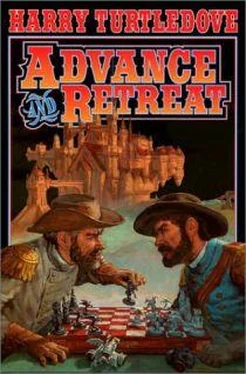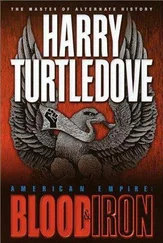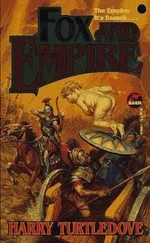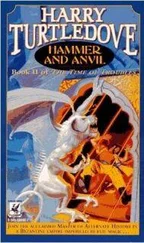When Ned reached the woods, he slid down off the unicorn and tethered it to the branch of an oak. He could move more quietly and less conspicuously on foot. That southron-if there had been a southron, if Ned hadn’t been imagining things-had gone in a couple of hundred yards from where Ned was now. Ned hurried forward, flitting from tree trunk to tree trunk like one of the ghosts the blonds believed to haunt the wilderness. Ned didn’t believe in those ghosts, though he did want to send that southron’s spirit down to the hells.
A flash of white-was that the enemy soldier’s unicorn? Ned of the Forest drifted closer. Yes, that was the unicorn, and there sat the southron, still mounted. Fool , Ned thought. You’ll pay for that . The gray-clad soldier had sword in hand, and no doubt felt very safe, very secure. What he felt and what was real were two different things, as he’d soon find out.
With a wordless bellow making do for a battle cry, Ned rushed him. The southron cried out, too, in horror. He had to twist his body awkwardly to meet Ned’s attack, for the northern commander of unicorn-riders approached on his left side, and he, like most men, used his right hand.
Swords clashed. The southron managed to turn Ned’s first stroke. The second laid open his thigh. The third tore into his belly. He shrieked. His blood poured down the unicorn’s white, white flank. Ned of the Forest pulled him out of the saddle and finished him with a thrust through the throat.
That done, Ned sprang onto the unicorn’s back. It snorted fearfully and tried to rear. He used his weight and the reins and the pressure of his knees to force it down again. Then he rode it back toward his own men, pausing to reclaim the animal he’d tethered before going hunting for the scout.
The troopers cheered when he emerged from the rain riding one unicorn and leading another. They knew what that had to mean. “Scratch one southron,” somebody called, and the rest of the riders took up the cry. Ned waved, pleased with them and pleased with himself.
“Looks like you were right, sir,” Colonel Biffle said.
Ned shrugged. “He got careless. The gods won’t help you if you don’t give ’em a chance.”
“I expect you’re right,” Biffle agreed.
“You bet I am.” But then Ned started thinking about some of the things King Geoffrey had done, most notably leaving Count Thraxton in command much too long, till far too much of the east was lost. The gods won’t help you if you don’t give ’em a chance . He wished he hadn’t put it quite like that.
* * *
Captain Gremio squelched through mud that threatened to pull off his shoes with every step he took. The road would have been bad any which way. It was even worse because Ned of the Forest’s unicorns had chewed it into a quagmire before any of General Bell’s footsoldiers marched down it.
“Come on! Keep it up! We can do it!” Gremio called to the soldiers of the company he commanded. The men from Palmetto Province slogged along in no particular order. But they did keep moving. Gremio didn’t suppose he could ask for more than that.
One of the soldiers grinned a wet, muddy grin at him. “You going to send us to jail if we don’t?” he asked.
Back in Karlsburg, Gremio had been a barrister. That made him unusual among northern officers, most of whom came from the ranks of the nobility. Baron Ormerod, whom he’d replaced, had owned an estate outside Karlsburg. But Ormerod was a year dead now, killed in the disastrous battle of Proselytizers’ Rise. Gremio had led the company since he fell.
He knew he couldn’t be too sensitive when soldiers teased him. If he were, they’d never give him any peace. He managed a grin of his own as he answered, “Not likely, Landels. My job back there was keeping people out of jail, not putting them in. Of course” — he stroked his bearded chin- “for you I might make an exception.”
Landels laughed. He had to, for the men around him were laughing, too. Show you had a thin skin and you would pay and pay and pay.
Colonel Florizel, the regimental commander, rode up on a unicorn. No one held that against him; he had a wounded foot that had never healed the way it should have. “How are things, Captain?” he called.
“As well as can be expected, sir,” Gremio answered.
Florizel nodded, apparently satisfied, and rode on. He hadn’t asked the question that most needed asking, at least to Gremio: how well can things be expected to be? Like most soldiers in General Bell’s army, Florizel seemed to think everything was fine. After all, the Army of Franklin was moving forward again, wasn’t it? Soon it would reenter the province for which it was named, wouldn’t it? How could anything be wrong when that was so?
Some people-a lot of people, evidently-had no sense of proportion. That was how things looked to Gremio. A lot of people had trouble seeing what lay in front of their faces. The realm Grand Duke-now King-Geoffrey had fought so hard to form was in trouble. King Avram’s men held the whole length of the Great River, cutting Geoffrey’s kingdom in half. General Hesmucet, against whom the Army of Franklin had fought so long and so hard, was cutting a swath of destruction through Peachtree Province as he marched toward the Western Ocean, with no one able to stop him or even to slow him down very much. The Army of Southern Parthenia was trapped in Pierreville, with no chance for Duke Edward of Arlington to break free.
Gremio sighed. General Bell loudly proclaimed that his move south would set all the new kingdom’s troubles right. Gremio hoped he knew what he was talking about. The barrister-turned-soldier didn’t believe that. He was trained to examine evidence and see where it led. He didn’t believe, but he did hope.
“Come along! Straighten it up!” Sergeant Thisbe called. “Look like men, gods damn it, not a shambling herd of goats!” Thisbe’s light, true tenor pierced the noise of the rain like a rapier piercing flesh. Unlike those of most Detinan men, Thisbe’s cheeks were bare of beard. The soldiers, as soldiers often will, paid more attention to their sergeant than they did to a captain.
Trouble seeing what lay in front of their faces… Gremio laughed, though it wasn’t really funny. How long had he had trouble seeing what lay in front of his face? Only the whole war, up until a couple of months before. If Thisbe hadn’t been wounded, Gremio knew he would still be a blind man. He also knew Thisbe wished he still were a blind man.
“How are you feeling?” he asked the sergeant.
“Just fine now, thanks,” Thisbe answered. “You see? I didn’t need to go to the healers after all.”
“You were smart not to, Sergeant,” Landels said. “Those bastards will help somebody every now and again, but they bury more than they cure.”
“I was smart not to, sure enough,” Thisbe said. The sergeant’s eyes were on Gremio. He knew just what those words meant, or thought he did. Landels and the other ordinary soldiers marching down the muddy road didn’t.
All I have to do is open my mouth, and Thisbe is gone from this company , Gremio thought. He and the sergeant both knew that. He could see some excellent good reasons for speaking up, too. On the other hand, the company would lose far and away its best underofficer if he did. And Thisbe would hate him forever, too.
He didn’t know which of those worried him more. That he didn’t know worried him all by itself. That he didn’t know was, in fact, one of his better arguments for talking things over with Colonel Florizel.
He’d thought so for weeks. No matter what he’d thought, though, he’d kept quiet up till now. That he’d kept quiet worried him, too. He stole a glance at Thisbe. Thisbe, as it happened, was looking at him. The sergeant kept trying to pretend the wound and everything that followed from it had never happened. Gremio had gone along with that up till now. He knew it couldn’t last forever, though.
Читать дальше












